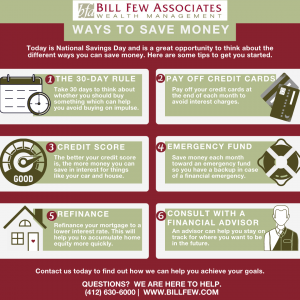Today is National Savings Day and is a great opportunity to consider different ways you can save money and if you are saving enough. It is always a good idea to periodically review the basics of saving money and budgeting so that you are prepared in case of a financial emergency, or for large ticket items such as a down payment on a car or house.
Saving is important and can provide you with a sense of financial freedom and can ultimately reduce financial and emotional stress. If you are interested in your finances and planning for the future, one way you can make sure you are on track is by hiring an experienced financial advisor. Hiring the right professional that fits your needs can make a difference and help you achieve your financial goals. In the meantime, below are 10 tips that can help you save money:
- Try the 30-Day Rule – Have you heard of the 30-day savings rule? Give it a try. With this rule, you take 30 days to think about whether you should buy something which can help you avoid buying on impulse. For example, if you saw an item that you want to buy, make a note of it, and wait 30 days. After 30 days, think about that item again and decide if you still feel as strongly about buying it as you did before.
- Pay Off Credit Cards Monthly – If you have a credit card, or multiple credit cards, pay them off at the end of each month. Avoiding interest is key and is extra money in your pocket (or savings) each month instead of that extra money going to the credit card company.
- Use a Free Budgeting Tool – One way to keep track of your money without much effort is by using a budgeting tool. There are many free options to choose from, and you may be surprised at how much you can save just by keeping a closer watch on your daily spending.
- Start an Emergency Fund – While it may be recommended to save around 6 months of your income in case of a financial emergency, do not feel overwhelmed because you can most definitely start small. Try starting with $500 to $1,000, and then plan small goals for yourself to add to it each month.
- Manage Your Credit Score – The better your credit score is, the more money you can save in interest for things like your car, house, and credit cards. You can contact your financial expert to help with this, but a few of the ways to improve your credit score are: pay your bills on time, pay off loans or keep balances low, avoid applying for new credit too much in a short period of time, and dispute any items that are not accurate on your credit report.
- Set Up Automatic Transfers to Your Savings – One way to save with the “out of sight, out of mind” motto is by setting up automatic transfers from your checking into your savings each month, or more frequently if you can. If you get paid twice per month, you can set up transfers to be made around those times while ensuring you have enough money left to pay for your monthly bills at the right time. These automatic transfers can help you save without even thinking about it.
- Consider or Review Tax-Sheltered Retirement Savings Plans – Are you contributing a portion of your pre-tax paycheck to tax-sheltered investments, such as an IRA or your employer provided 401K? Many employers provide a match of employee contributions and will make contributions through automatic payroll deductions which makes saving easier for you. A professional financial advisor can help you understand the different types of tax-sheltered retirement plans and which might best suit your situation.
- Reevaluate Your Insurance Policies – Take a close look at the insurance policies you have. In some cases, you may see that you have more coverage than you need. Also, you may be able to shop around for a better price on the coverage that you do need.
- Refinance Your Mortgage – If you can refinance your mortgage to a lower interest rate, explore the option. Having a lower interest rate will help you accumulate home equity more quickly and give you more money in your pocket to pay for other things.
- Consult with a Financial Advisor – If you do not have a financial advisor, now might be a good time to find one that fits your needs. An experienced financial advisor can give you peace of mind, help you stay organized, and keep you on track for where you want to be in the future. If you are not sure how to find the right financial advisor, here is some information to help.
RELATED: Read about our retirement planning tips.
There are many ways to save money, and with today being National Savings Day, why not give some of these tips a try. Remember, even making small changes to saving more and staying consistent with your savings strategy can yield big savings later.
At Bill Few Associates, we do everything we can to give your financial future maximum potential with minimal hassle. Call us today at 412-630-6000 to find out how we can help you achieve your goals. Our experienced financial advisors are here to help. Give us a call.
(412) 630-6000
(800) 245-5939
(412) 630-6001 fax


